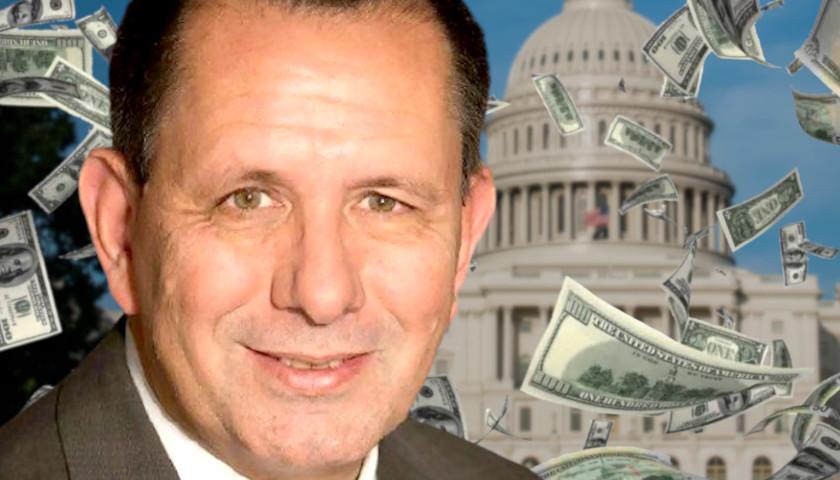Live from Music Row Wednesday morning on The Tennessee Star Report with Michael Patrick Leahy – broadcast on Nashville’s Talk Radio 98.3 and 1510 WLAC weekdays from 5:00 a.m. to 8:00 a.m. – host Leahy welcomed the original all-star panelist Crom Carmichael to the studio to discuss big business and Joe Biden’s intent on regulating everything from the federal level.
Leahy: In studio, the original all-star panelist, Crom Carmichael. Crom, we are pointing out some of the flaws in the current occupant of 1600 Pennsylvania Avenue, Joe Biden.
We could do this all day – 24 hours a day, seven days a week – but we have just a brief period of time. Which flaw do you want to point out?
Carmichael: Well, right now, Michael, I do like to use Biden as an example of what not to do. (Leahy laughs) I say it that way because it isn’t personal except for what he did to Clarence Thomas.
That’s personal. But the rest of it should be instructive. And it doesn’t matter whether or not if I got hit by a bus going 80 miles an hour or a train going 80 miles an hour, it doesn’t matter that the train is bigger than the bus.
The result is exactly the same. So it doesn’t matter whether or not a Republican does something stupid or a Democrat does something stupid.
Leahy: In the end, it’s just –
Carmichael: It’s just stupid because I can point to things that both of the Bushes did. They were Republicans, and I thought that they did things that were bad as president.
They were president, and I wasn’t, so they did it. I’m trying to use what Joe Biden does, not because it’s just Joe Biden, but because it’s instructive on the policy side.
Leahy: Well, it’s objectively stupid.
Carmichael: Yes. Yes. And so we don’t want the next person to be a Republican who also does stupid things. I think a lot of things Nixon did were stupid.
Leahy: Absolutely. Our official position at The Tennessee Star Report: We are against stupid public policy decisions.
Carmichael: Bingo! There you go. Well said. Well said. So here’s this article. It’s written by Robert Bork, Jr. What an interesting father he had.
Leahy: And what legacy.
Carmichael: What a legacy he left us. But he talks about how Robert Bork, his father, in the late 60s spent a great deal of time working on what he considered to be the antitrust paradox.
And that is what should be the role of government when it comes to antitrust policy. And what Robert Bork, Sr. finally came down on after an immense amount of studying was that the consumer should be making sure that the consumer is protected and should be the objective of any antitrust policy.
Just because a business is big doesn’t necessarily mean that it’s bad. And I want to give an example of a Republican who in many ways I like but in this particular case, I don’t.
And that is Josh Hawley. He falls down on the side that any business that is big is bad. Just bigness is bad. I think it can be. Bigness can be bad.
Leahy: Let me push back just a little bit here. The concept that a monopoly is bad is enshrined in the American statute in the Sherman Antitrust Act of 1890. Just to point that out. But I agree with that, actually.
Carmichael: Well, bigness does not necessarily mean it’s a monopoly. The question is, I guess if we want to diverge just for a bit, what is a monopoly?
AT&T, before the break-up, was a monopoly. But why was it a monopoly? Because the government used its power to eliminate all of its competitors.
Leahy: We’re going in a direction of agreement on that. Continue with your points.
Carmichael: The direction that Biden seems to want to go in is the idea of regulating. Shoot, I’m missing the quote. But he wants to regulate everything. He wants to regulate pharmaceuticals.
Leahy: I think I know where you’re going with this. So keep on rolling.
Carmichael: And in regulating it he wants all of the businesses to kowtow to Washington, the businesses to kowtow to Washington.
Whether or not the consumer is helped or hurt, is secondary to the kowtowing. Here’s what’s interesting about this article. Biden says in the article that without his policies we won’t have economic growth.
From 1980 to 2002, we’ve had a long-term period of low taxation and less regulation than we did in the prior 40 years. The inflation-adjusted annual rate of return has been nine point nine percent over a 40-year period.
Biden says that we don’t have enough small businesses. The small businesses are being hurt. But since 1980, the number of small businesses has increased 54 percent.
Leahy: Over what period of time?
Carmichael: Since 1980.
Leahy: To today?
Carmichael: To today, it’s increased 54 percent. And so here’s the question. What you have to do is you have to set your guardrails to make sure what you’re trying to achieve doesn’t end up hurting what you claim you’re about.
Listen to the full third hour here:
– – –
Tune in weekdays from 5:00 – 8:00 a.m. to the Tennessee Star Report with Michael Patrick Leahy on Talk Radio 98.3 FM WLAC 1510. Listen online at iHeart Radio.




